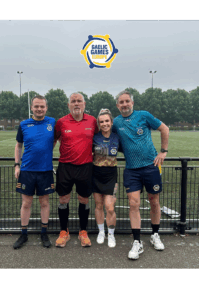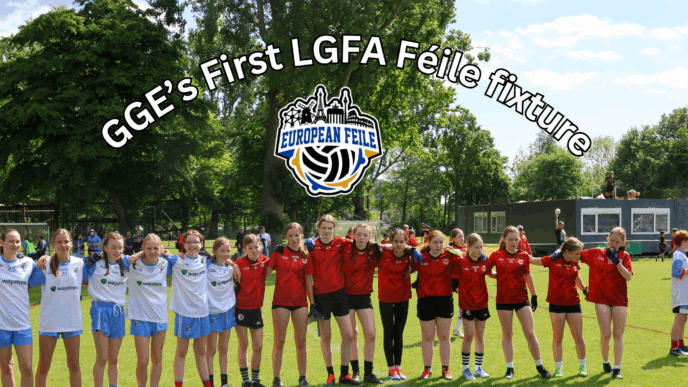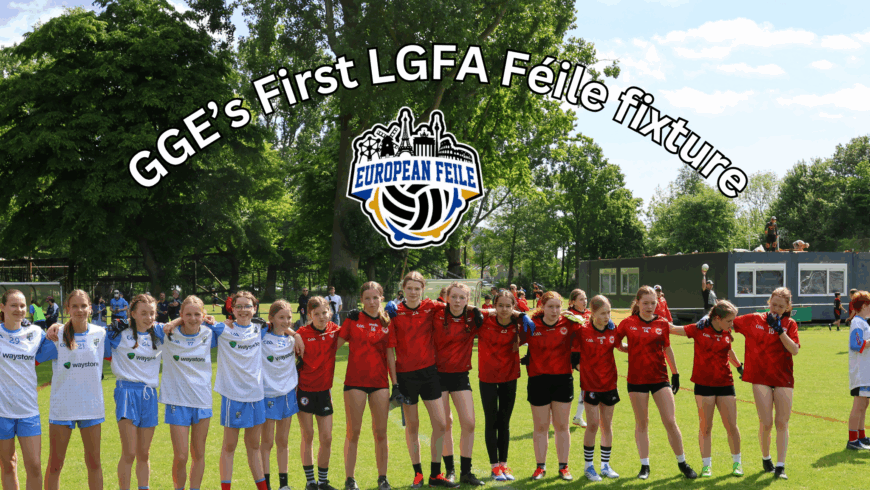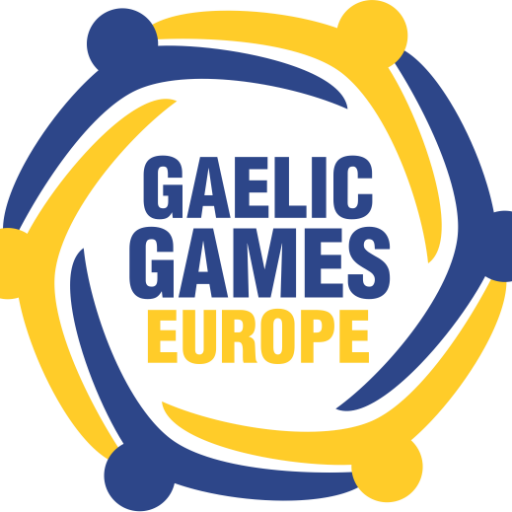Celebrating some of the Trailblazing Women of Gaelic Games Europe, and their contributions to the Féile – and beyond!
In a landmark year for Gaelic Games Europe (GGE), 2025 has seen the women of our community blaze new trails, and expand the horizons of our games. At the heart of this momentum stands the Féile – held in Amsterdam – which, for the first time, featured young Ladies Gaelic Football Association (LGFA) teams, marking a powerful new chapter in our European story.
This moment wasn’t just symbolic; it was historic. For many of the young girls who took the pitch, it was their first taste of structured Gaelic football at an international event. For GGE, it was an emphatic statement of intent: that our commitment to inclusiveness and equality isn’t theoretical – it’s visible on every pitch, in every corner of Europe.
At the heart of this historic Féile was Amsterdam GAC, proud hosts of this year’s event and one of the powerhouses of Gaelic Games in Europe. Eimer Lafferty, Chairperson of Amsterdam, reflects on the significance of Féile 2024 and the role women continue to play in the club’s success story. Amsterdam isn’t just one of Europe’s oldest and largest clubs – it’s also the most successful 15-a-side Hurling, and 15-a-side Gaelic Football club on the continent, having claimed every Hurling European championship title to date. Their leadership, both on and off the pitch, is a shining example of the strength, and ambition that drives Gaelic Games Europe forward.
Another shining light in this year’s Féile was GSC Luxembourg, Europe’s oldest Gaelic Games club, who made headlines by bringing two youth teams to the competition – a first for any Féile in Europe. This bold step marks not only the club’s commitment to developing the next generation, but also the immense efforts of the women at the heart of GSC Lux, who have worked tirelessly to keep girls in the game and create a supportive, thriving environment for young players. In our next feature, we speak with Elaine Jobart from GSC Luxembourg to explore the passion, planning, and people behind this incredible progress.
Another of Europe’s mega clubs, Den Haag GAC, shares the distinction with Luxembourg of being older than Gaelic Games Europe itself. As one of the continent’s true pioneers, Den Haag has built a legacy of excellence both on and off the field. Best known for hosting the iconic Den Haag International Tournament, the longest-running and most prestigious European challenge event for visiting Irish clubs – the festival celebrated its 17th edition this year with an unexpected and unforgettable twist: the LGFA finals were won by the Galician Ladies, defeating a field packed with Irish teams composed entirely of Irish-born players. A landmark result that speaks volumes about the standard and spirit of Ladies Football in Europe.
Driving the next generation forward is Catriona Rush, a key figure in youth development at Den Haag and a passionate advocate for inclusion and growth. With leaders like Catriona at the helm, Den Haag’s youth section continues to inspire, nurture, and shape a future where girls across Europe see themselves not only in the game, but at its very centre. Caitriona also offers some coaching tips and insights for parents entering the coaching sphere!
To round off this celebration of female leadership in Gaelic Games Europe, we caught up with two inspirational voices from Eintracht Frankfurt GAA, Fiona and Julie. Their message was clear and vital: it’s never too late to get involved, and having female coaches is absolutely essential to keeping young girls in sport. Their passion, insight, and commitment to inclusion struck a powerful chord — a reminder that representation truly matters.
Frankfurt is rapidly emerging as a club to watch, with exciting youth and development projects already underway. And Fiona and Julie are leading the charge, not just shaping a team, but shaping a future. Their call to action is simple, and urgent: “Parents, we need female coaches!”
It’s not all parents dipping their toes into coaching for the first time in Europe – you’ll also find greatness quietly at work. Sue Ramsbottom, a legend of Laois Ladies Football, now lends her experience and expertise to coaching in Strasbourg. A multiple All-Ireland finalist, she finally clinched the coveted All-Ireland Senior Championship medal in 2001. Her exceptional talent was recognized with seven TG4 All-Star awards spanning from 1988 to 1997. Beyond Gaelic football, Sue also represented Ireland in rugby, earning three caps in 1998. Her outstanding contributions to sport have been honored with her induction into the LGFA Hall of Fame in 2024. Now, as a coach in Strasbourg, she continues to inspire the next generation, demonstrating that legends of the game are actively shaping the future of Gaelic Games in Europe.
The engine that powers Gaelic Games Europe is bouncing, fueled by passionate volunteers across 24 countries. From referees to club founders, coaches to committee chairs, it’s the collective energy of our people that’s driving Gaelic Games forward at a record pace. And over the past few years, that engine has kicked into overdrive – largely thanks to the women of Gaelic Games Europe.
Nowhere was that more visible than at Féile 2024, from the pitch to the sidelines, it was a weekend of proud firsts, bold leadership, and an overwhelming sense of momentum. Hear from some of our young talent below!
Beyond the Féile – one code, in particular, has harnessed that momentum like never before: Camogie.
Enter Shauna Coen, a proud Galway woman and Gaelic Games Europe’s Camogie Officer, who has spearheaded the most dramatic growth of any code in our 25-year history. In just 12 months, Camogie participation across Europe has doubled, with six new clubs established in 2024- three in the first half of this year alone. And fittingly, Shauna has also broken new ground herself – becoming Europe’s first dedicated female Camogie referee.

This is the heart of Gaelic Games Europe in 2024: codes growing, and young girls stepping confidently into roles they may never have imagined, all because someone, somewhere, created the space for them to play.
Indeed, the success of this year’s Féile and the rise of women’s participation are direct reflections of the dedication of countless volunteers, coaches, and mentors who have championed female participation for years. Their tireless work has helped GGE deliver on its strategic pillar of inclusiveness, ensuring the values of respect, community identity, and amateur ethos are not only protected but strengthened.
This year’s momentum is no accident. It’s the result of years of nurturing foundations, building inclusive communities, and creating safe, empowering environments where women and girls can thrive. To truly understand how far we’ve come, it’s important to look back to those who laid the earliest building blocks of women’s Gaelic Games in Europe. One such pioneer is Mary Gavin, whose involvement predates the very existence of the European County Board.
At a time when there was no LGFA presence in Europe, Mary was already planting the seeds of growth and inclusion that so many now benefit from. In this special interview, Mary reflects on those early days – the challenges, the milestones, and the remarkable journey of women’s involvement abroad. In recognition of her tireless work and lasting impact, the Native Camogie Cup at the GAA World Games now proudly carries her name – a tribute to a true pioneer, and an all-round legend, whose legacy continues to inspire generations across Europe and beyond.
Maith sibh, mná na hEorpa abú!






